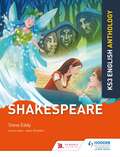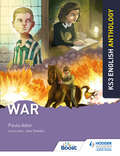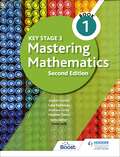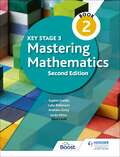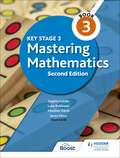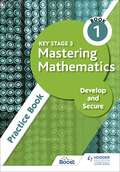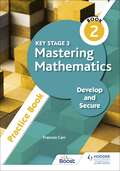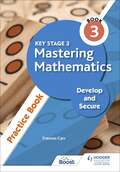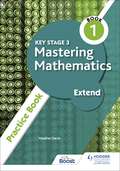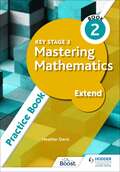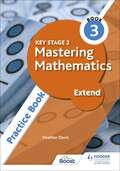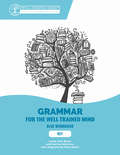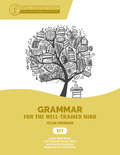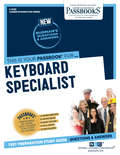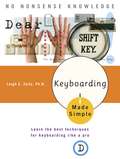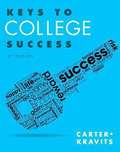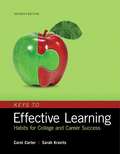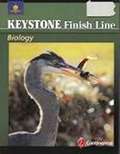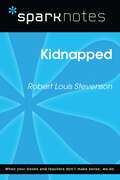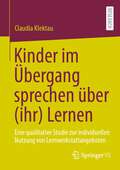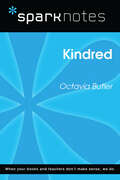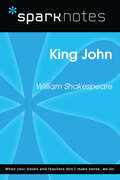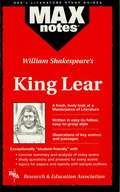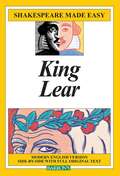- Table View
- List View
Key Stage 3 English Anthology: Shakespeare
by Steve EddyInspire your teaching with Key Stage 3 English Anthology: Shakespeare, a themed anthology for Year 7 through to Year 9. Featuring key extracts from A Midsummer Night's Dream, Romeo and Juliet and Macbeth, the Anthology guides students through each play, encouraging them to engage with the text to gain a thorough understanding of the context and literary techniques underpinning Shakespeare's work. Each extract is supported by Teaching and Learning Resources, including quizzes, lesson plans and PowerPoint slides to help you implement the content of the book. Each extract includes:- A context panel to provide key information to set the scene of Elizabethan England- Glossaries and annotations to help students work through each extract confidently - Look closely: key questions for students to consider as they work through the extracts- Now try this: writing and speaking activities to encourage students to get creative and actively engage with the text- Fast finisher tasks to support students who race ahead- A practice question to familiarise students with the command words they will see at GCSE
Key Stage 3 English Anthology: War
by Paula AdairInspire your teaching with Key Stage 3 English Anthology: War, a themed anthology for Year 8.Featuring a moving mixture of poetry and prose, this Anthology guides students through a variety of extracts encouraging them to connect with the text to gain a thorough understanding of the context and literary techniques underpinning each piece of work.Each extract is supported by Teaching and Learning Resources, including quizzes, lesson plans and PowerPoint slides to help you implement the content of the book.Each extract includes:- A context panel to provide key information to set the scene of each extract- Glossaries and annotations to help students work through each extract confidently- Look closer: key questions for students to consider as they work through the extracts- Now try this: writing and speaking activities to encourage students to get creative and actively engage with the text- Fast finisher tasks to support students who race ahead- A practice question to familiarise students with the command words they will see at GCSE
Key Stage 3 English Anthology: War
by Paula AdairInspire your teaching with Key Stage 3 English Anthology: War, a themed anthology for Year 8.Featuring a moving mixture of poetry and prose, this Anthology guides students through a variety of extracts encouraging them to connect with the text to gain a thorough understanding of the context and literary techniques underpinning each piece of work.Each extract is supported by Teaching and Learning Resources, including quizzes, lesson plans and PowerPoint slides to help you implement the content of the book.Each extract includes:- A context panel to provide key information to set the scene of each extract- Glossaries and annotations to help students work through each extract confidently- Look closer: key questions for students to consider as they work through the extracts- Now try this: writing and speaking activities to encourage students to get creative and actively engage with the text- Fast finisher tasks to support students who race ahead- A practice question to familiarise students with the command words they will see at GCSE
Key Stage 3 Mastering Mathematics Book 1
by Sophie Goldie Luke RobinsonWith small steps and our carefully crafted questions, every pupil will achieve greater progress.Designed to be used flexibly, this second edition textbook has been updated to include more Mastery-style questions and whole-class activities. Whether you follow a full Mastery scheme, choose to use Mastery aspects or you're just looking for quality resources, our three textbooks support the way you want to teach.Each book gradually builds on prior knowledge, developing pupils' confidence, fluency, reasoning and problem-solving skills.· Secure understanding with differentiated questions and worked examples that build on prior knowledge, following the 'do it, secure it, deepen it' Mastery structure· Recap skills and topics from Key Stage 2, ensuring a smooth transition to Key Stage 3· Target key skills using the fluency, reasoning and problem-solving markers in the margin· Build confidence with starter activities and warm-up questions to introduce each concept· Develop reasoning skills using non-examples, where pupils identify mistakes in sample answers· Track progress through review questions, building key skills and knowledge· Benefit from the expertise of UK Mastery trained subject specialists with over 30 years of teaching experience· Cover the full UK National Curriculum and all four strands - number, algebra, geometry and measures, statistics and probability - within our three restructured textbooks for Key Stage 3Our flexible, Mastery-led approachOur flexible approach allows you to teach maths your way. You can choose to focus on building understanding using the graduated questions or take a Mastery approach to exposition using manipulatives and 'concrete, pictorial, abstract' in the optional class activities.Answers will be provided online.
Key Stage 3 Mastering Mathematics Book 2
by Sophie Goldie Luke Robinson Andrew GintyWith small steps and our carefully crafted questions, every pupil will achieve greater progress.Designed to be used flexibly, this second edition textbook has been updated to include more Mastery-style questions and whole-class activities. Whether you follow a full Mastery scheme, choose to use Mastery aspects or you're just looking for quality resources, our three textbooks support the way you want to teach.Each book gradually builds on prior knowledge, developing pupils' confidence, fluency, reasoning and problem-solving skills.· Secure understanding with differentiated questions and worked examples that build on prior knowledge, following the 'do it, secure it, deepen it' Mastery structure, building on prior knowledge from Book 1· Target key skills using the fluency, reasoning and problem-solving markers in the margin· Build confidence with starter activities and warm-up questions to introduce each concept· Develop reasoning skills using non-examples, where pupils identify mistakes in sample answers· Track progress through review questions, building key skills and knowledge· Benefit from the expertise of UK Mastery trained subject specialists with over 30 years of teaching experience· Cover the full UK National Curriculum and all four strands - number, algebra, geometry and measures, statistics and probability - within our three restructured textbooks for Key Stage 3Our flexible, Mastery-led approachOur flexible approach allows you to teach maths your way. You can choose to focus on building understanding using the graduated questions or take a Mastery approach to exposition using manipulatives and 'concrete, pictorial, abstract' in the optional class activities.Answers will be provided online.
Key Stage 3 Mastering Mathematics Book 3
by Heather Davis Sophie Goldie Luke RobinsonWith small steps and our carefully crafted questions, every pupil will achieve greater progress.Designed to be used flexibly, this second edition textbook has been updated to include more Mastery-style questions and whole-class activities. Whether you follow a full Mastery scheme, choose to use Mastery aspects or you're just looking for quality resources, our three textbooks support the way you want to teach.Each book gradually builds on prior knowledge, developing pupils' confidence, fluency, reasoning and problem-solving skills.· Secure understanding with differentiated questions and worked examples that follow the 'do it, secure it, deepen it' Mastery structure, building on prior knowledge from Book 2· Target key skills using the fluency, reasoning and problem-solving markers in the margin· Build confidence with starter activities and warm-up questions to introduce each concept· Develop reasoning skills using non-examples, where pupils identify mistakes in sample answers· Track progress through review questions, building key skills and knowledge so students will be prepared for the next step up to GCSE· Benefit from the expertise of UK Mastery trained subject specialists with over 30 years of teaching experience· Cover the full UK National Curriculum and all four strands - number, algebra, geometry and measures, statistics and probability - within our three restructured textbooks for Key Stage 3Our flexible, Mastery-led approachOur flexible approach allows you to teach maths your way. You can choose to focus on building understanding using the graduated questions or take a Mastery approach to exposition using manipulatives and 'concrete, pictorial, abstract' in the optional class activities.Answers will be provided online.
Key Stage 3 Mastering Mathematics Develop and Secure Practice Book 1
by Frances CarrBuild key fluency and reasoning skills and prepare for problem-solving with extra practice. This book is packed with questions that take small steps to enable sustained progress and is perfect for intervention.- Bridge the gap from KS2 to KS3 by recapping the key skills and content needed for KS3- Develop knowledge and understanding with practice questions that get progressively more difficult following a Mastery approach to learning- Support pupils with helpful reminders and explanations alongside hints for trickier questions- Help to engage pupils with questions that relate maths to outside of the classroom and plenty of colourful images- Enable home learning with answers available online
Key Stage 3 Mastering Mathematics Develop and Secure Practice Book 2
by Frances CarrBuild key fluency, reasoning and problem-solving skills with extra practice. This book is packed with questions that take small steps to enable sustained progress and is perfect for intervention.- Develop knowledge and understanding with practice questions that get progressively more difficult following a Mastery approach to learning- Support pupils with helpful reminders and explanations alongside hints for trickier questions- Help to engage pupils with questions that relate maths to outside of the classroom and plenty of colourful images- Enable home learning with answers available online
Key Stage 3 Mastering Mathematics Develop and Secure Practice Book 3
by Frances CarrBuild key fluency, reasoning and problem-solving skills with extra practice. This book is packed with questions that take small steps to enable sustained progress and is perfect for intervention.- Develop knowledge and understanding with practice questions that get progressively more difficult following a Mastery approach to learning- Support pupils with helpful reminders and explanations alongside hints for trickier questions- Help to engage pupils with questions that relate maths to outside of the classroom and plenty of colourful images- Enable home learning with answers available online
Key Stage 3 Mastering Mathematics Extend Practice Book 1
by Heather DavisStrengthen problem-solving skills and challenge more able pupils through extra practice. This book is packed with questions that are perfect for extension activities and learning beyond the curriculum.- Ensure sustained progress and greater depth for more able pupils with challenging practice questions designed to improve their fluency, reasoning and problem-solving skills- Follow a Mastery approach to learning with questions that get progressively more difficult through small steps - Promote conceptual understanding with questions that encourage pupils to apply and reflect on their knowledge- Enable home learning with answers available online
Key Stage 3 Mastering Mathematics Extend Practice Book 2
by Heather DavisStrengthen problem-solving skills and challenge more able pupils through extra practice. This book is packed with questions that are perfect for extension activities and learning beyond the curriculum.- Ensure sustained progress and greater depth for more able pupils with challenging practice questions designed to improve their fluency, reasoning and problem-solving skills- Follow a Mastery approach to learning with questions that get progressively more difficult through small steps - Promote conceptual understanding with questions that encourage pupils to apply and reflect on their knowledge- Enable home learning with answers available online
Key Stage 3 Mastering Mathematics Extend Practice Book 3
by Heather DavisStrengthen problem-solving skills and challenge more able pupils through extra practice. This book is packed with questions that are perfect for extension activities and learning beyond the curriculum.- Ensure sustained progress and greater depth for more able pupils with challenging practice questions designed to improve their fluency, reasoning and problem-solving skills- Follow a Mastery approach to learning with questions that get progressively more difficult through small steps - Promote conceptual understanding with questions that encourage pupils to apply and reflect on their knowledge- Enable home learning with answers available online
Key to Blue Workbook: A Complete Course For Young Writers, Aspiring Rhetoricians, And Anyone Else Who Needs To Understand How English Works (Grammar for the Well-Trained Mind #9)
by Susan Wise BauerThe Key to the Blue Workbook gives clear, thoroughly-explained answers to all exercises in the Blue Workbook, one of four workbooks in the Grammar for the Well-Trained Mind series, providing detailed, well-designed exercises in the correct use of English grammar. The Key to the Blue Workbook gives clear, thoroughly-explained answers to all exercises in the Blue Workbook, one of four non-sequential books in the Grammar for the Well-Trained Mind series, providing detailed, well-designed exercises in the correct use of English grammar. The Key, along with the accompanying Blue Workbook and the Core Instructor Text, make up Grammar for the Well-Trained Mind: a complete course that takes students from basic definitions (“A noun is the name of a person, place, thing, or idea”) through advanced sentence structure and analysis, all the grammar skills needed to write and speak with eloquence and confidence. This innovative program combines the three essential elements of language learning: understanding and memorizing rules (prescriptive teaching), repeated exposure to examples of how those rules are used (descriptive instruction), and practice using those rules in exercises and in writing (practical experience). Each year, parents and teachers go through the dialogue, rules, and examples in the Core Instructor Text; students follow along in the Workbook. This repetition solidifies the concepts, definitions, and examples in the student’s mind. There are four Workbooks, one for each year. Each Workbook contains the same rules and examples, but four completely different sets of exercises and assignments, allowing students to develop a wide-ranging knowledge of how the rules and examples are put to use in writing. Each Key to the Workbooks provides not only answers, but also explanations for the parent/instructor, and guidance as to when the answers might be ambiguous (as, in English, they often are). All of the rules covered, along with the repeated examples for each, are assembled for ongoing reference in the Comprehensive Handbook of Rules (soon to be renamed as The Grammar Guidebook). Every step of the sentence diagramming process is gathered for reference, along with illustrations, in The Diagramming Dictionary. These will become the student’s indispensable guide to writing through high school, into college and beyond. Step-by-step instruction takes students from the most basic concepts through advanced grammatical concepts such as modal and hortative verbs and multiple functions of noun clauses. Extensive diagramming exercises reinforce the rules and help technical and visual learners to understand and use the English language effectively. Each step of the diagramming process is illustrated and thoroughly explained to the student. Text for examples and exercises are drawn from great works of literature, as well as from well-written nonfiction texts in science, mathematics, and the social sciences. Regular review is built into each year of work. The Key accompanies one of four non-sequential workbooks, each containing new exercises that allow students to practice and apply the grammar principles under study.
Key to Yellow Workbook: A Complete Course For Young Writers, Aspiring Rhetoricians, And Anyone Else Who Needs To Understand How English Works (Grammar for the Well-Trained Mind #0)
by Susan Wise Bauer Audrey Anderson Jessica OttoThe Key to Yellow Workbook gives clear, thoroughly-explained answers to all exercises in the Yellow Workbook, one of four non-sequential workbooks in the Grammar for the Well-Trained Mind series, providing detailed, well-designed exercises in the correct use of English grammar for middle-school and high-school level students, as well as grammar aficionados of any age. The Key to Yellow Workbook gives clear, thoroughly-explained answers to all exercises in the Yellow Workbook, one of four non-sequential books in the Grammar for the Well-Trained Mind series, providing detailed, well-designed exercises in the correct use of English grammar. The Key, along with the accompanying Yellow Workbook and the Core Instructor Text, make up Grammar for the Well-Trained Mind: a complete course that takes students from basic definitions (“A noun is the name of a person, place, thing, or idea”) through advanced sentence structure and analysis, all the grammar skills needed to write and speak with eloquence and confidence. This innovative program combines the three essential elements of language learning: understanding and memorizing rules (prescriptive teaching), repeated exposure to examples of how those rules are used (descriptive instruction), and practice using those rules in exercises and in writing (practical experience). Each year, parents and teachers go through the dialogue, rules, and examples in the Core Instructor Text; students follow along in the Workbook. This repetition solidifies the concepts, definitions, and examples in the student’s mind. There are four Workbooks, one for each year. Each Workbook contains the same rules and examples, but four completely different sets of exercises and assignments, allowing students to develop a wide-ranging knowledge of how the rules and examples are put to use in writing. Each Key to the Workbooks provides not only answers, but also explanations for the parent/instructor, and guidance as to when the answers might be ambiguous (as, in English, they often are). All of the rules covered, along with the repeated examples for each, are assembled for ongoing reference in The Grammar Guidebook. Every step of the sentence diagramming process is gathered for reference, along with illustrations, in The Diagramming Dictionary. These will become the student’s indispensable guide to writing through high school, into college and beyond. Step-by-step instruction takes students from the most basic concepts through advanced grammatical concepts such as modal and hortative verbs and multiple functions of noun clauses. Extensive diagramming exercises reinforce the rules and help technical and visual learners to understand and use the English language effectively. Each step of the diagramming process is illustrated and thoroughly explained to the student. Text for examples and exercises are drawn from great works of literature, as well as from well-written nonfiction texts in science, mathematics, and the social sciences. Regular review is built into each year of work. The Key accompanies one of four non-sequential workbooks, each containing new exercises that allow students to practice and apply the grammar principles under study.
Keyboard Specialist: Passbooks Study Guide (Career Examination Series #C-3493)
by National Learning CorporationThe Keyboard Specialist Passbook® prepares you for your test by allowing you to take practice exams in the subjects you need to study. It provides hundreds of questions and answers in the areas that will likely be covered on your upcoming exam, including but not limited to: spelling; English grammar; English usage; punctuation; keyboarding practices; and more.
Keyboarding Made Simple: Learn the best techniques for keyboarding like a pro (Made Simple)
by Leigh E. ZeitzLeave hunt-and-peck to the chickens. Effective and efficient keyboarding is more than tapping the correct letter. Designed for individual and classroom use, this book teaches you to react to letters instead of finding them on the keyboard. This breakthrough guide brims with step-by-step exercises for keyboarding with ease. Develop your digital dexterity with Keyboarding Made Simple. Topics covered include: * correct body positioning and posture * basic letters, numbers, and symbols * faster keyboarding using AutoWords and AutoBlends * using text alignment and justification * envelopes and letters * using columns to create newsletters * avoiding common errors * mastering the keypad * handling electronic communication.
Keys to College Success
by Carol Carter; Sarah Lyman KravitsPersonalized Learning with My Student Success Lab; College Connection to Career and Life Goals; Thinking Skills coverage; Tailored to the four-year program experience.
Keys to Effective Learning: Habits for College and Career Success
by Carol Carter; Sarah Lyman KravitsKeys to Effective Learning nurtures these skills in students entering college by focusing on building accountability, teamwork, and critical/creative thinking skills that can be applied to any academic or workplace setting.
Keystone Finish Line: Biology Workbook
by Continental Press StaffGive your students every chance for success with Keystone Finish Line Biology. This workbook reviews Pennsylvania's Assessment Anchors and Eligible Content of the Keystone Biology Exam, and familiarizes students with the format of tested question types. Practice questions range in difficulty, with many Depth of Knowledge (DOK) levels 2 and 3 items that call for higher-order reasoning. Supportive illustrations, graphs, and artwork build on concepts. Units include multiple-choice items and rigorous constructed-response problems that test multiple anchors. A review section at the end of each module can be used as a practice test. Practice questions are frequently posed in real-life contexts. Learning support includes reminders and examples for illustration. Students will also see guided examples with explanations that show how to find the answer in a logical way. A glossary of important terms is included.
Kidnapped (SparkNotes Literature Guide Series)
by SparkNotesKidnapped (SparkNotes Literature Guide) by Robert Louis Stevenson Making the reading experience fun! Created by Harvard students for students everywhere, SparkNotes is a new breed of study guide: smarter, better, faster. Geared to what today's students need to know, SparkNotes provides: *Chapter-by-chapter analysis *Explanations of key themes, motifs, and symbols *A review quiz and essay topicsLively and accessible, these guides are perfect for late-night studying and writing papers
Kinder im Übergang sprechen über (ihr) Lernen: Eine qualitative Studie zur individuellen Nutzung von Lernwerkstattangeboten
by Claudia KlektauWie sprechen Kinder, die kurz vor der Einschulung stehen, über ihr Lernen im Kindergarten, insbesondere in der Lernwerkstatt? Und welche Vorstellungen haben sie vom Lernen in der Schule? Diese Fragen stehen im Zentrum der vorliegenden Studie. Über detaillierte fallspezifische Rekonstruktionen wird expliziert, wie unterschiedlich Kinder das räumlich-materielle Arrangement einer Lernwerkstatt im Kindergarten für eigene individuelle Lernpraktiken nutzen und welche Orientierungen dabei für sie handlungsleitend sind. Anhand der von der Autorin analysierten Interviews mit Kindergartenkindern wird zudem gezeigt, welche Vorstellungen und Bilder diese von Schule respektive schulischem Lernen aufrufen und welche Entwicklungsaufgaben, die sich den Kindern im Übergang zur Grundschule stellen, sichtbar werden. Die Ergebnisse der Studie weisen auf die Bedeutung der professionellen Begleitung des Übergangs vom Kindergarten in die Grundschule hin und sind so auch für Pädagog*innen beider Institutionen von Interesse.
Kindred (SparkNotes Literature Guide Series)
by SparkNotesKindred (SparkNotes Literature Guide) by Octavia Butler Making the reading experience fun! Created by Harvard students for students everywhere, SparkNotes is a new breed of study guide: smarter, better, faster. Geared to what today's students need to know, SparkNotes provides: *Chapter-by-chapter analysis *Explanations of key themes, motifs, and symbols *A review quiz and essay topicsLively and accessible, these guides are perfect for late-night studying and writing papers
King John (SparkNotes Literature Guide Series)
by SparkNotesKing John (SparkNotes Literature Guide) by William Shakespeare Making the reading experience fun! Created by Harvard students for students everywhere, SparkNotes is a new breed of study guide: smarter, better, faster. Geared to what today's students need to know, SparkNotes provides: *Chapter-by-chapter analysis *Explanations of key themes, motifs, and symbols *A review quiz and essay topicsLively and accessible, these guides are perfect for late-night studying and writing papers
King Lear (MAXNotes Literature Guides)
by Corinna RuthREA's MAXnotes for William Shakespeare's King Lear The MAXnotes offers a comprehensive summary and analysis of King Lear and a biography of William Shakespeare. Places the events of the play in historical context and discusses each act in detail. Includes study questions and answers along with topics for papers and sample outlines.
King Lear (Shakespeare Made Easy)
by William Shakespeare Alan DurbandHere are the books that help teach Shakespeare plays without the teacher constantly needing to explain and define Elizabethan terms, slang, and other ways of expression that are different from our own. Each play is presented with Shakespeare's original lines on each left-hand page, and a modern, easy-to-understand "translation" on the facing right-hand page. All dramas are complete, with every original Shakespearian line, and a full-length modern rendition of the text. These invaluable teaching-study guides also include: Helpful background information that puts each play in its historical perspective. Discussion questions that teachers can use to spark student class participation, and which students can use as springboards for their own themes and term papers. Fact quizzes, sample examinations, and other features that improve student comprehension of what each play is about.
